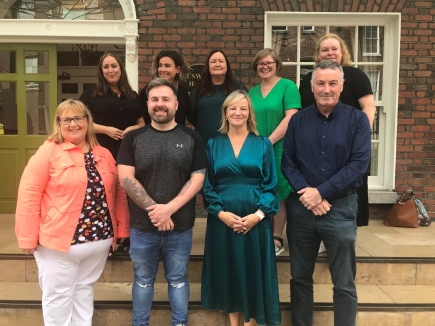Referendum on family, care and gender equality is historic opportunity to shape our shared future
Published: Thursday, September 07, 2023

A coalition of five civil society organisations, including the National Women’s Council (NWC), Treoir, One Family, Family Carers Ireland and SIPTU, today (7th September) called on the Government to publish the wording for the announced referendum on family, care and gender equality in line with the recommendations of the Citizens’ Assembly on Gender Equality and the Joint Oireachtas Committee on Gender Equality report.
They also called for clarity in terms of the timeline for the referendum which was scheduled to take place in November 2023.
Speaking at a joint press conference, Orla O’Connor, Director of the National Women’s Council said,
“This referendum is an historic opportunity to bring our Constitution in line with the Ireland of today and shape our shared future. The outdated language on ‘women’s duties in the home’ never reflected the reality of women’s lives and was at the heart deep gender inequalities, such as the marriage bar. This is our chance to remove the limits on women from our Constitution and instead recognise the value of care in all of its forms, in the home and in the wider community. And it is our chance to recognise and protect all families equally, including but not limited to the marital family.
We are calling on the Government to publish wording in line with the mandate of the Citizens’ Assembly and Joint Oireachtas Committee recommendations and clarify the timeline for the referendum.”
Damien Peelo, CEO of Treoir, said:
“This is a very important referendum as Ireland continues its progress towards a more inclusive and caring society. For over 40 years Treoir has advocated for the recognition of all family types in our constitution and not just the family based on marriage. In 2022 there were 24,754 (43%) of births outside of marriage according to the CSO, and this percentage keeps rising. All of these families need and deserve recognition, support and protection by our constitution.”
Ethel Buckley, Deputy General Secretary, SIPTU said:
“The forthcoming referendum on the inclusion of care in our constitution is a critical moment for SIPTU and Irish society. This referendum will provide a unique opportunity to recognise the value and importance of care and the care workforce. In making its final decisions on the wording, the government must include care in all its forms, both in the home and outside the home, so that all those who provide care are valued, anything less will not be acceptable to SIPTU.
SIPTU looks forward to working with our members throughout Ireland and with civil society organisations in a referendum campaign that will build a national consensus on the importance of care work to all our lives and will recognise the essential services that the care workforce provides.”
Catherine Cox, Head of Communications and Policy with Family Carers Ireland stated:
“For far too many years care in the home and the community, provided by both women and men, has gone unrecognised, undervalued and under-resourced. A referendum to replace the outdated and sexist reference to women in Article 41.2 of the constitution with wording that recognises the societal value of care in the home and wider community and obliges the State to take reasonable measures to support carers, is our opportunity to change this. However, all members of society must have the chance to be informed about the amendments they are being asked to vote on and what these changes can achieve for women, carers, care workers and non-martial families and therefore we must see the proposed wording as a matter of urgency”.
The press conference also included personal testimonies of people affected by the issues discussed in this referendum, including Maria Doyle, who is a lone parent after her partner died suddenly in 2021, Annmarie Tibby, who is a care worker and Chairperson of SIPTU’s Care Sector and Lynsey O’Donovan who is a family carer.
The press conference followed an open letter by the five organisations to the Taoiseach Leo Varadkar in August 2023.
Ends/
